Officeholders
Elected national officials
Vice president
| Name | Image | Term | Ethnicity | State | Party | Offices held |
|---|---|---|---|---|---|---|
| Kamala Harris (1964–) |  | 2021–2025 | Indian American | California | Democratic | Harris, who is half Indian American, [8] became the US' first female vice president, the highest-ranking female elected official in U.S. history, and the first African-American and first Asian American vice president. [9] [10] |
Congress
Senate
(Note: Senators are organized first in chronological order according to their first term in office, then second in alphabetical order according to their surname.)
| Senator | Asian and/or Pacific Islander ethnicity | Party | State | Tenure | Notes | |||
|---|---|---|---|---|---|---|---|---|
| Term start | Term end | Length of service | ||||||
 | Hiram Fong (1906–2004) | Chinese [S 1] | Republican | Hawaii | August 21, 1959 | January 3, 1977 | 17 years, 135 days | Retired |
 | Daniel Inouye (1924–2012) | Japanese [S 2] | Democratic | Hawaii | January 3, 1963 | December 17, 2012 | 49 years, 349 days | Died in office |
 | S. I. Hayakawa (1906–1992) | Japanese | Republican | California | January 2, 1977 | January 3, 1983 | 6 years, 1 day | Retired |
 | Spark Matsunaga (1916–1990) | Japanese | Democratic | Hawaii | January 3, 1977 | April 15, 1990 | 13 years, 102 days | Died in office |
 | Daniel Akaka (1924–2018) | Hawaiian, Chinese [S 3] | Democratic | Hawaii | May 16, 1990 | January 3, 2013 | 22 years, 232 days | Initially appointed; later re-elected Retired |
 | John Ensign (born 1958) | Filipino [S 4] | Republican | Nevada | January 3, 2001 | May 3, 2011 | 10 years, 120 days | Resigned |
 | Mazie Hirono (born 1947) | Japanese [S 5] | Democratic | Hawaii | January 3, 2013 | Incumbent | 13 years, 1 day | |
 | Tammy Duckworth (born 1968) | Thai, Chinese [S 6] | Democratic | Illinois | January 3, 2017 | Incumbent | 9 years, 1 day | |
 | Kamala Harris (born 1964) | Indian [S 7] | Democratic | California | January 3, 2017 | January 18, 2021 | 4 years, 15 days | Resigned to become Vice President |
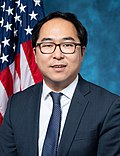 | Andy Kim (born 1982) | Korean [S 8] | Democratic | New Jersey | December 8, 2024 | Incumbent | 1 year, 27 days | |
- ↑ First American of Chinese ancestry elected to Congress
- ↑ First Japanese American elected to the Senate
- ↑ First Native Hawaiian to serve in the Senate
- ↑ First person of Filipino ancestry elected to the Senate
- ↑ First Asian American woman elected to the Senate
- ↑ First Thai American elected to the Senate
- ↑ First person of South Asian ancestry elected to the Senate; together with Pramila Jayapal, first Indian American woman elected to Congress
- ↑ First Korean American elected to the Senate
House of Representatives
(Note: Representatives are organized first in chronological order according to their first term in office, then second in alphabetical order according to their surname.)
| Representative | Asian and/or Pacific Islander ethnicity | Party | State | Tenure | Notes | |||
|---|---|---|---|---|---|---|---|---|
| Term start | Term end | Length of service | ||||||
 | Dalip Singh Saund (1899–1973) | Indian [H 1] | Democratic | California | January 3, 1957 | January 3, 1963 | 6 years, 0 days | Lost reelection |
 | Daniel Inouye (1924–2012) | Japanese [H 2] | Democratic | Hawaii | August 21, 1959 | January 3, 1963 | 3 years, 135 days | Retired to run successfully for U.S. Senate |
 | Spark Matsunaga (1916–1990) | Japanese | Democratic | Hawaii | January 3, 1963 | January 3, 1977 | 14 years, 0 days | Retired to run successfully for U.S. Senate |
 | Patsy Mink (1927–2002) | Japanese [H 3] | Democratic | Hawaii | January 3, 1965 | January 3, 1977 | 12 years, 0 days | Retired to run unsuccessfully for U.S. Senate |
| September 22, 1990 | September 28, 2002 | 12 years, 6 days | Died in office | |||||
 | Norman Mineta (1931–2022) | Japanese | Democratic | California | January 3, 1975 | October 10, 1995 | 20 years, 280 days | Resigned Later served as Secretary of Commerce and Secretary of Transportation |
 | Daniel Akaka (1924–2018) | Chinese | Democratic | Hawaii | January 3, 1977 | May 16, 1990 | 13 years, 133 days | Resigned after being appointed to the U.S. Senate |
 | Bob Matsui (1941–2005) | Japanese | Democratic | California | January 3, 1979 | January 1, 2005 | 25 years, 364 days | Died in office |
 | Mervyn Dymally (1926–2012) | Indian [H 4] | Democratic | California | January 3, 1981 | January 3, 1993 | 12 years, 0 days | Retired |
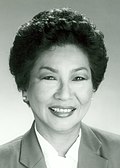 | Pat Saiki (born 1930) | Japanese | Republican | Hawaii | January 3, 1987 | January 3, 1991 | 4 years, 0 days | Retired to run unsuccessfully for U.S. Senate |
 | Jay Kim (born 1939) | Korean [H 5] | Republican | California | January 3, 1993 | January 3, 1999 | 6 years, 0 days | Lost renomination |
 | Bobby Scott (born 1947) | Filipino [H 6] | Democratic | Virginia | January 3, 1993 | Incumbent | 33 years, 1 day | |
 | John Ensign (born 1958) | Filipino | Republican | Nevada | January 3, 1995 | January 3, 1999 | 4 years, 0 days | Retired to run unsuccessfully for U.S. Senate Later elected to the U.S. Senate from Nevada |
 | David Wu (born 1955) | Taiwanese [H 7] | Democratic | Oregon | January 3, 1999 | August 3, 2011 | 12 years, 212 days | Resigned |
 | Mike Honda (born 1941) | Japanese | Democratic | California | January 3, 2001 | January 3, 2017 | 16 years, 0 days | Lost reelection |
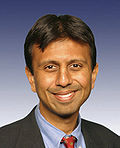 | Bobby Jindal (born 1971) | Indian | Republican | Louisiana | January 3, 2005 | January 14, 2008 | 3 years, 11 days | Resigned to run successfully for Governor |
 | Doris Matsui (born 1944) | Japanese | Democratic | California | March 8, 2005 | Incumbent | 20 years, 302 days | Elected to succeed late husband |
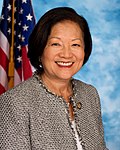 | Mazie Hirono (born 1947) | Japanese | Democratic | Hawaii | January 3, 2007 | January 3, 2013 | 6 years, 0 days | Retired to run successfully for U.S. Senate |
 | Steve Austria (born 1958) | Filipino | Republican | Ohio | January 3, 2009 | January 3, 2013 | 4 years, 0 days | Retired following decennial redistricting |
 | Joseph Cao (born 1967) | Vietnamese [H 8] | Republican | Louisiana | January 3, 2009 | January 3, 2011 | 2 years, 0 days | Lost reelection |
 | Judy Chu (born 1953) | Chinese [H 9] | Democratic | California | July 14, 2009 | Incumbent | 16 years, 174 days | |
 | Charles Djou (born 1970) | Thai, Chinese [H 10] | Republican | Hawaii | May 22, 2010 | January 3, 2011 | 226 days | Lost reelection |
 | Hansen Clarke (born 1957) | Bangladeshi [H 11] | Democratic | Michigan | January 3, 2011 | January 3, 2013 | 2 years, 0 days | Lost renomination following decennial redistricting |
 | Colleen Hanabusa (born 1951) | Japanese | Democratic | Hawaii | January 3, 2011 | January 3, 2015 | 4 years, 0 days | Retired to run unsuccessfully for U.S. Senate |
| November 14, 2016 | January 3, 2019 | 2 years, 50 days | Retired to run unsuccessfully for Governor | |||||
 | Ami Bera (born 1965) | Indian | Democratic | California | January 3, 2013 | Incumbent | 13 years, 1 day | |
 | Tammy Duckworth (born 1968) | Thai, Chinese [H 12] | Democratic | Illinois | January 3, 2013 | January 3, 2017 | 4 years, 0 days | Retired to run successfully for U.S. Senate |
 | Grace Meng (born 1975) | Taiwanese [H 13] | Democratic | New York | January 3, 2013 | Incumbent | 13 years, 1 day | |
 | Mark Takano (born 1960) | Japanese [H 14] | Democratic | California | January 3, 2013 | Incumbent | 13 years, 1 day | |
 | Ted Lieu (born 1969) | Taiwanese | Democratic | California | January 3, 2015 | Incumbent | 11 years, 1 day | |
 | Mark Takai (1967–2016) | Japanese | Democratic | Hawaii | January 3, 2015 | July 20, 2016 | 1 year, 199 days | Died in office |
 | Pramila Jayapal (born 1965) | Indian [H 15] | Democratic | Washington | January 3, 2017 | Incumbent | 9 years, 1 day | |
 | Ro Khanna (born 1976) | Indian | Democratic | California | January 3, 2017 | Incumbent | 9 years, 1 day | |
 | Raja Krishnamoorthi (born 1973) | Indian | Democratic | Illinois | January 3, 2017 | Incumbent | 9 years, 1 day | |
 | Stephanie Murphy (born 1978) | Vietnamese [H 16] | Democratic | Florida | January 3, 2017 | January 3, 2023 | 6 years, 0 days | Retired |
 | TJ Cox (born 1963) | Filipino, Chinese | Democratic | California | January 3, 2019 | January 3, 2021 | 2 years, 0 days | Lost reelection |
 | Andy Kim (born 1982) | Korean | Democratic | New Jersey | January 3, 2019 | December 8, 2024 | 5 years, 340 days | Retired to run successfully for U.S. Senate |
 | Young Kim (born 1962) | Korean [H 17] | Republican | California | January 3, 2021 | Incumbent | 5 years, 1 day | |
 | Michelle Steel (born 1955) | Korean [H 17] | Republican | California | January 3, 2021 | January 3, 2025 | 5 years, 1 day | Lost reelection |
 | Marilyn Strickland (born 1962) | Korean [H 17] | Democratic | Washington | January 3, 2021 | Incumbent | 5 years, 1 day | |
 | Shri Thanedar (born 1955) | Indian | Democratic | Michigan | January 3, 2023 | Incumbent | 3 years, 1 day | |
 | Jill Tokuda (born 1976) | Japanese | Democratic | Hawaii | January 3, 2023 | Incumbent | 3 years, 1 day | |
 | Vince Fong (born 1979) | Chinese | Republican | California | June 3, 2024 | Incumbent | 1 year, 215 days | |
 | Dave Min (born 1976) | Korean | Democratic | California | January 3, 2025 | Incumbent | 1 year, 1 day | |
 | Suhas Subramanyam (born 1986) | Indian | Democratic | Virginia | January 3, 2025 | Incumbent | 1 year, 1 day | |
 | Derek Tran (born 1980) | Vietnamese | Democratic | California | January 3, 2025 | Incumbent | 1 year, 1 day | |
- ↑ First AAPI person elected to Congress as a non-delegate, and also first Indian American elected to Congress
- ↑ First Japanese American elected to Congress
- ↑ First Asian American woman elected to Congress
- ↑ First (and so far only) Dougla elected to Congress
- ↑ First Korean American elected to Congress
- ↑ First American-born Filipino elected to Congress
- ↑ First Taiwanese American elected to Congress
- ↑ First Vietnamese American elected to Congress
- ↑ First Chinese American woman elected to Congress
- ↑ First Thai American elected to Congress
- ↑ First person of Bangladeshi ancestry elected to Congress
- ↑ First Thai American woman elected to Congress
- ↑ First Taiwanese American woman elected to Congress
- ↑ First openly gay person of AAPI ancestry elected to Congress
- ↑ Together with Kamala Harris, first Indian American woman elected to Congress
- ↑ First Vietnamese American woman elected to Congress
- 1 2 3 Reps. Kim, Steel and Strickland are collectively the first Korean American women elected to Congress
State and local government
Governors
| Name | Image | Term | Ethnicity | State | Party | Offices held |
|---|---|---|---|---|---|---|
| George Ariyoshi (1926–) |  | 1974–1986 | Japanese American | Hawaii | Democratic | First American of Asian descent to be elected governor of a state of the United States. [11] He continues to hold the record as the longest-serving state governor in Hawaii. |
| Ben Cayetano (1939–) | 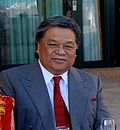 | 1994–2002 | Filipino American | Hawaii | Democratic | First Filipino American to serve as a state governor in the United States. [12] |
| Gary Locke (1950–) |  | 1997–2005 | Chinese American | Washington | Democratic | First Chinese American to be elected governor in United States history and the first Asian American governor in the continental United States. [13] |
| Bobby Jindal (1971–) |  | 2008–2016 | Indian American | Louisiana | Republican | Served in various executive positions in Louisiana and the U.S. Department of Health and Human Services before being elected to Congress in 2004, and finally winning the Louisiana gubernatorial elections in 2007 (thereby becoming the first non-white governor of Louisiana since Reconstruction), the first elected Indian American governor in U.S. history, [14] as well as the second Asian American governor to serve in the continental United States. |
| Nikki Haley (1972–) |  | 2011–2017 | Indian American | South Carolina | Republican | Served as the 116th Governor of South Carolina from 2011 to 2017. Haley previously represented Lexington County in the South Carolina House of Representatives from 2005 to 2010. [15] She is the first Sikh American governor in the United States, [16] first female governor of South Carolina, [16] second elected Indian American governor in U.S. history, [17] as well as the third Asian American governor to serve in the continental United States. Nikki Haley's election was not the only first for Asian Americans to occur during the 2010 election cycle. |
| David Ige (1957–) |  | 2014–2022 | Japanese American | Hawaii | Democratic | Served as the 8th governor of Hawaii from 2014 to 2022. First person of Okinawan descent to hold office in the U.S. [18] |
Statewide offices
State Legislative offices
| Name | Image | Term | Ethnicity | State | Party | Offices held |
|---|---|---|---|---|---|---|
| Kazuhisa Abe (1914–1996) | 1959–1966 | Japanese American | Hawaii | Democratic | Served in the Hawaii State Senate, including as Senate President in 1965–1966 (after Nelson Doi). | |
| Noboru Miyake (1896–1988) | 1959–1966 | Japanese American | Hawaii | Republican | Served in the Hawaii State Senate. | |
| Steere Noda (1892–1986) | 1959–1962 | Japanese American | Hawaii | Democratic | Served in the Hawaii State Senate. | |
| Sakae Takahashi (1919–2001) | 1959–1974 | Japanese American | Hawaii | Democratic | Served in the Hawaii State Senate. | |
| John T. Ushijima (1924–2006) | 1959–1982 | Japanese American | Hawaii | Democratic | Served in the Hawaii State Senate. | |
| Nadao Yoshinaga (1919–2009) | 1959–1974 | Japanese American | Hawaii | Democratic | Served in the Hawaii State Senate. | |
| Tadao Beppu (1919–1993) | 1959–1976 | Japanese American | Hawaii | Democratic | Served in the Hawaii House of Representatives, including as Speaker of the House from 1968 to 1974. Also served as secretary of the Hawaii Constitutional Convention of 1968. | |
| James H. Wakatsuki (1929–1992) | 1959–1980 | Japanese American | Hawaii | Democratic | Served in the Hawaii House of Representatives, including as Speaker of the House from 1975 to 1980. Later served as a Hawaii Supreme Court justice. | |
| Yoshito Takamine (1924–2015) | 1959–1984 | Japanese American | Hawaii | Democratic | Served in the Hawaii House of Representatives. | |
| Robert Fukuda (1922–2013) | 1959–1962 | Japanese American | Hawaii | Republican | Served in the Hawaii House of Representatives. Later served as U.S. Attorney in Hawaii from 1969 to 1973. | |
| Alfred H. Song (1919–2004) |  | 1963–1978 | Korean American | California | Democratic | Served in the California State Assembly and California State Senate. |
| Edmond Gong (1930–2015) |  | 1966–1972 | Chinese American | Florida | Democratic | Served in the Florida House of Representatives. First Asian American legislator in Florida. |
| March Fong Eu (1922–2017) |  | 1967–1974 | Chinese American | California | Democratic | Served in the California State Assembly. |
| Tom Hom (1927–) |  | 1968–1970 | Chinese American | California | Republican | Served in the California State Assembly. |
| Paul Bannai (1920–2019) |  | 1973–1980 | Japanese American | California | Republican | Served in the California State Assembly. |
| John Eng (1942–) |  | 1973–1983 | Hong Kong American | Washington | Democratic | First Asian American legislator in Washington state. |
| Thelma Buchholdt (1934–2007) |  | 1975–1983 | Filipino American | Alaska | Democratic | Served in the Alaska House of Representatives. First Filipino American woman legislator in the United States. |
| S. Floyd Mori (1939–) | 1975–1980 | Japanese American | California | Democratic | Served in the California State Assembly. | |
| Jerry Chang | 1988–2012 | Chinese American | Hawaii | Democratic | Served in the Hawaii House of Representatives. | |
| Nao Takasugi (1922–2009) | 1992–1998 | Japanese American | California | Republican | Served in the California State Assembly. | |
| David Valderrama (1933–) | 1991–2003 | Filipino American | Maryland | Democratic | Served in the Maryland House of Delegates from 1991 to 2003. First Filipino American elected to a state legislature in the contiguous United States. | |
| John Lim (1935–) |  | 1993–2001, 2005-2009 | Korean American | Oregon | Republican | Served in the Oregon State Senate from 1993 to 2001. Served in the Oregon House of Representatives from 2005 to 2009. While in the Oregon State Senate, he served as Majority Leader. |
| Nimi McConigley | 1994–1996 | Indian American | Wyoming | Republican | Served in the Wyoming House of Representatives from 1994 to 1996. First Indian born person to be elected to any state legislature. | |
| Mike Honda (1941–) |  | 1996–2000 | Japanese American | California | Democratic | Served in the California State Assembly. |
| John Pippy (1970–) |  | 1997–2003, 2003-2012 | Thai American | Pennsylvania | Republican | Served in the Pennsylvania House of Representatives from 1997 to 2003 before being elected to the Pennsylvania State Senate. |
| George Nakano (1935–) | 1998–2004 | Japanese American | California | Democratic | Served in the California State Assembly. | |
| Blake Oshiro (1970–) |  | 2001–2011 | Okinawan American | Hawaii | Democratic | Served in the Hawaii House of Representatives from 2001 to 2011. Oshiro was majority leader during his tenure. |
| Saghir Tahir (1945–2013) | 2001–2011 | Pakistani American | New Hampshire | Republican | Served in the New Hampshire House of Representatives from 2001 to 2011. First Pakistan native to be elected to any state legislature, and first Muslim American elected to any political office in the United States. | |
| Corinne Ching | 2002–2012 | Chinese American | Hawaii | Republican | Served in the Hawaii House of Representatives. | |
| Shirley Horton (1952–) |  | 2002–2008 | Japanese American | California | Republican | Served in the California State Assembly. |
| Nikki Haley (1972–) |  | 2005–2011 | Indian American | South Carolina | Republican | Serving in the South Carolina House of Representatives from 2005 to 2011. First Indian American to be elected to the South Carolina legislature. She would later be elected governor. |
| Hubert Vo (1956–) | 2005–present | Vietnamese American | Texas | Democratic | Serving in the Texas House of Representatives since 2005. First Vietnamese American to be elected to the Texas Legislature. | |
| Kris Valderrama (1970–) |  | 2007–present | Filipino American | Maryland | Democratic | Served in the Maryland House of Delegates |
| Saqib Ali (1971–) |  | 2007–2011 | Pakistani American Indian American | Maryland | Democratic | Served in the Maryland House of Delegates |
| Tony Fulton (1972–) | 2007–2013 | Filipino American | Nebraska | Republican | Served in the Nebraska Legislature from 2007 to 2013. Currently the tax commissioner of Nebraska. | |
| Sharon Har |  | 2007–2022 | Korean American | Hawaii | Democratic | Served in the Hawaii House of Representatives. |
| Scott Kawasaki (1975–) |  | 2007–2019, 2019–present | Japanese American | Alaska | Democratic | Served in the Alaska House of Representatives from 2007 to 2019 before being elected to the Alaska State Senate in 2019. |
| Angie Chen Button (1954–) |  | 2009–present | Chinese American | Texas | Republican | Serving in the Texas House of Representatives since 2009. |
| Tony Hwang (1964–) |  | 2009–2015, 2015–present | Taiwanese American | Connecticut | Republican | Served in the Connecticut House of Representatives from 2009 to 2015 before being elected to the Connecticut State Senate where he currently serves. |
| Mark Keam (1966–) |  | 2010–2022 | Korean American | Virginia | Democratic | Served in the Virginia House of Delegates |
| Aruna Miller (1964–) |  | 2010–2019 | Indian American | Maryland | Democratic | Served in the Maryland House of Delegates. First Indian American to be elected to the Maryland General Assembly. She would later be elected lieutenant governor. |
| B. J. Pak (1980–) |  | 2011–2017 | Korean American | Georgia | Republican | Served in the Georgia House of Representatives from 2011 to 2017. In 2017 he was nominated and confirmed as United States Attorney for the Northern District of Georgia |
| Phil Ting (1969–) | 2012-present | Chinese American | California | Democratic | Serving in the California State Assembly since 2012. | |
| Ron Kim (1979–) |  | 2013–present | Korean American | New York | Democratic | Serving in the New York State Assembly |
| Brian Shiozawa |  | 2013–2017 | Japanese American | Utah | Republican | Served in the Utah State Senate |
| Gene Wu (1978–) |  | 2013–present | Chinese American | Texas | Democratic | Serving in the Texas House of Representatives since 2013. |
| Ling Ling Chang (1976–) |  | 2014–2016, 2018-2020 | Taiwanese American | California | Republican | From 2014 to 2016 Chang served in the California State Assembly. In 2016 she ran for a seat in the California State Senate and lost, but the incumbent was recalled, and she won the special election for the remainder of his term. |
| Janet Nguyen (1976–) |  | 2014–2018, 2020–2022, 2022–present | Vietnamese American | California | Republican | From 2014 to 2018 Nguyen served in the California State Senate making her the first Vietnamese American to serve in any state senate. After narrowly losing reelection, she ran for and won a seat in the California State Assembly in 2020. In 2022 Nguyen ran again for the California State Senate and won. |
| Ervin Yen |  | 2014–2018 | Taiwanese American | Oklahoma | Republican | Served in the Oklahoma Senate from 2014 to 2018. |
| Roxanne Persaud |  | 2015-2015, 2015–present | Indian American | New York | Democratic | Served in the New York State Assembly from January 2015-November 2015. Serving in the New York Senate since 2015. |
| Mark S. Chang (1978–) |  | 2015–present | Korean American | Maryland | Democratic | Serving in the Maryland House of Delegates since 2015. |
| Jay Jalisi (1965–) |  | 2015–2023 | Pakistani American | Maryland | Democratic | Served in the Maryland House of Delegates from 2015 to 2023. |
| Clarence Lam (1980–) |  | 2015–2019, 2019–present | Chinese American | Maryland | Democratic | Served in the Maryland House of Delegates from 2015 to 2019 before being elected to the Maryland Senate in 2019, where he is currently. |
| David Moon (1979–) |  | 2015–present | Korean American | Maryland | Democratic | Serving in the Maryland House of Delegates since 2015, and as Majority Leader since 2023. |
| Phillip Chen (1978–) |  | 2016–present | Chinese American | California | Republican | Serving in the California State Assembly since 2016. |
| Steven Choi (1944–) |  | 2016–2022 | Korean American | California | Republican | Member of the California State Assembly |
| Vince Fong (1979–) |  | 2016–2024 | Chinese American | California | Republican | Served in the California State Assembly from 2016 until 2024. |
| Todd Gloria (1978–) |  | 2016–2020 | Filipino American | California | Democratic | House Majority Whip and member of the California State Assembly |
| Manka Dhingra (1973 or 1974–) |  | 2017–present | Indian American | Washington | Democratic | Serving in the Washington State Senate since 2017. |
| Bee Nguyen (1978–) |  | 2017–2023 | Vietnamese American | Georgia | Democratic | Serving in the Georgia House of Representatives from 2017 until 2023. First Vietnamese American in the Georgia House of Representatives. |
| Vandana Slatter (1981–) |  | 2017–present | Indian American | Washington | Democratic | Serving in the Washington State House since 2017. |
| Lei Learmont | 2017–2018 | Japanese American | Hawaii | Democratic | Serving in the Hawaii House of Representatives from 2017 to 2018. | |
| Dean Tran (1978–) |  | 2017–2021 | Vietnamese American | Massachusetts | Republican | Served in the Massachusetts Senate, first Vietnamese American to hold elected office in Massachusetts. |
| Tyler Diep |  | 2018–2020 | Vietnamese American | California | Republican | Served in the California State Assembly. |
| Val Okimoto | 2018–2022 | Japanese American Filipino American | Hawaii | Republican | Served in the Hawaii House of Representatives. Minority leader from 2021-2022. | |
| Daniel Pae (1995–) |  | 2018–present | Korean American | Oklahoma | Republican | Serving in the Oklahoma House of Representatives. |
| Jonathan Patterson (unknown) | 2019–present | Korean American | Missouri | Republican | Serving as the Speaker of the Missouri House of Representatives. | |
| Saud Anwar (1962–) |  | 2019–present | Pakistani American | Connecticut | Democratic | Serving in the Connecticut State Senate. |
| Harry Bhandari (1977–) |  | 2019–present | Nepalese American | Maryland | Democratic | Serving in the Maryland House of Delegates. |
| Lily Qi (1963–) |  | 2019–present | Chinese American | Maryland | Democratic | Serving in the Maryland House of Delegates |
| Kaohly Her (1978–) |  | 2019–present | Hmong American | Minnesota | Democratic | Serving in the Minnesota House of Representatives. |
| Tina Maharath (1978–) | 2019–2023 | Laotian American | Ohio | Democratic | Served in the Ohio State Senate from 2019 until 2023. First Laotian American elected to public office. | |
| Mike Giallombardo (1982-) |  | 2020-present | Korean American | Florida | Republican | Serving in the Florida House of Representatives since 2020. |
| Charlice Byrd (1951-) |  | 2021-present | Chinese American | Georgia | Republican | Serving in the Georgia house of representatives |
| Francesca Hong (1988–) | 2021–present | Korean American | Wisconsin | Democratic | Serving the 76th district of the Wisconsin State Assembly since January 4, 2021. She is the first Asian American state legislator to serve in the Wisconsin Legislature. | |
| Khanh Pham (1978–) |  | 2021–present | Vietnamese American | Oregon | Democratic | Serving the 46th district of the Oregon House of Representatives since January 11, 2021. She is the first Vietnamese American to serve in the Oregon Legislative Assembly. |
| Kimberly Fiorello (1975-) | 2021-2023 | Korean American | Connecticut | Republican | Serving in the Connecticut house of representatives | |
| Quang Nguyen (1962-) |  | 2021-present | Vietnamese American | Arizona | Republican | Serving in the Arizona House of Representatives since 2021. |
| Shri Thanedar (1955-) |  | 2021-2023 | Indian American | Michigan | Democratic | Serving in the Michigan House of Representatives from 2021 to 2023. |
| Rose Martinez (born 1958) | 2023–present | Filipino American | Hawaii | Democratic | Serving in the Hawaii House of Representatives since 2023. | |
| Tyson Miyake | 2023–present | Japanese American | Hawaii | Democratic | Serving in the Hawaii House of Representatives since 2023. | |
| Trish La Chica | 2023–present | Filipino American | Hawaii | Democratic | Serving in the Hawaii House of Representatives since 2023. | |
| Lester Chang (1973–) | 2023–present | Chinese American | New York | Republican | Serving in the New York State Assembly since 2023. | |
| Saira Draper | 2023–present | Pakistani American | Georgia | Democratic | Serving in the Georgia House of Representatives since 2023. | |
| Long Tran | 2023–present | Vietnamese American | Georgia | Democratic | Serving in the Georgia House of Representatives since 2023. | |
| Justin Jones (1995–) | 2023–present | Filipino American | Tennessee | Democratic | Served in the Tennessee House of Representatives from January 10, 2023 to April 6, 2023. | |
| Nabilah Islam (1989–) |  | 2023-present | Bangladeshi American | Georgia | Democratic | Serving in the Georgia House of Representatives since 2023. |
| Tri Ta (1973–) | 2023–present | Vietnamese American | California | Republican | Serving in the California State Assembly since 2023. | |
| Chao Wu (1976 or 1977–) |  | 2023–present | Chinese American | Maryland | Democratic | Serving in the Maryland House of Delegates since 2023. |
| May Mizuno | 2024–present | Filipino American | Hawaii | Democratic | Serving in the Hawaii House of Representatives since 2024. | |
| Sanjeev Manohar | 2024–present | Indian American | New Hampshire | Democratic | Serving in the New Hampshire House of Representatives since 2024. | |
| Hanadi Nadeem | 2024–present | Pakistani American | Nevada | Democratic | Serving in the Nevada Assembly since 2024. | |
| Sujata Gadkar-Wilcox | 2025–present | Indian American | Connecticut | Democratic | Serving in the Connecticut House of Representatives since 2025. | |
| Eleanor Sato | 2025–present | Japanese American | Maine | Democratic | Serving in the Maine House of Representatives since 2025. | |
| Tara Hong | 2025–present | Cambodian American | Massachusetts | Democratic | Serving in the Massachusetts House of Representatives since 2025. | |
Mayors
Historic
Benito Legarda and Pablo Ocampo, joined the House in 1907 as Resident Commissioners, [39] becoming the first Asian Americans to serve in the Congress, albeit as non-voting members. [40]

In 2010, Inouye was sworn in as President Pro Tempore making him the highest-ranking Asian American politician in American history until Kamala Harris was the first Asian American to become Vice President of the United States in November 2020, and assumed the role of President of the U.S. Senate.
Current
There are presently 16 Asian Americans or Pacific Islanders in the House and 2 in the Senate in the 118th United States Congress. [41] [42] The following marks the total number of Asian Americans in the U.S. Congress since 1957: 39 representatives and 9 senators. Representatives include those from Japanese, Taiwanese, Filipino, Thai, Indian, and Chinese backgrounds.
- Representatives Doris Matsui, Mark Takano, Jill Tokuda, and Senator Mazie Hirono are Japanese American.
- Representative Judy Chu is Chinese American.
- Representatives Grace Meng and Ted Lieu are Taiwanese Americans.
- Representative Bobby Scott is Filipino American.
- Senator Tammy Duckworth is Thai American.
- Representatives Ami Bera, Raja Krishnamoorthi, Pramila Jayapal, Ro Khanna, and Shri Thanedar are Indian American. [43]
- Representatives Andy Kim, Michelle Steel, Young Kim, and Marilyn Strickland are Korean American.
Note that Strickland and Scott are all multiracial. Strickland is one-half Korean and one-half African American; Scott is one-fourth Filipino and three-fourths African American.
Cabinet

Norman Mineta became the first Asian American Cabinet member when he was appointed secretary of commerce by President Bill Clinton in 2000. He then served as secretary of transportation from 2001 to 2006. [44]
In the George W. Bush Administration, Elaine Chao became the first, and thus far only, Asian American woman to serve as a Cabinet secretary when she became the secretary of labor in 2001, serving until 2009. [45] She has also served as secretary of transportation in the administration of Donald Trump in 2017, serving until her resignation in 2021.
In 2009, President Barack Obama appointed Eric Shinseki to the position of secretary of veterans affairs, which he held until 2014. Shinseki was the first Asian American to hold this position. Steven Chu, the first Asian American to hold the position of secretary of energy, served from 2009 to 2013. Additionally under Obama, Gary Locke served as secretary of commerce from 2009 to 2011.
In 2017, President Donald Trump appointed Nikki Haley the first Indian American to serve in a permanent Cabinet-level position when she was confirmed to the position of ambassador to the United Nations in 2017. She held the position until 2018.
In 2021, Kamala Harris became the highest ranking Asian American to serve in a cabinet as 49th Vice President of the United States. President Joe Biden also appointed Katherine Tai to serve as U.S. Trade Representative, a cabinet-level position.



















































